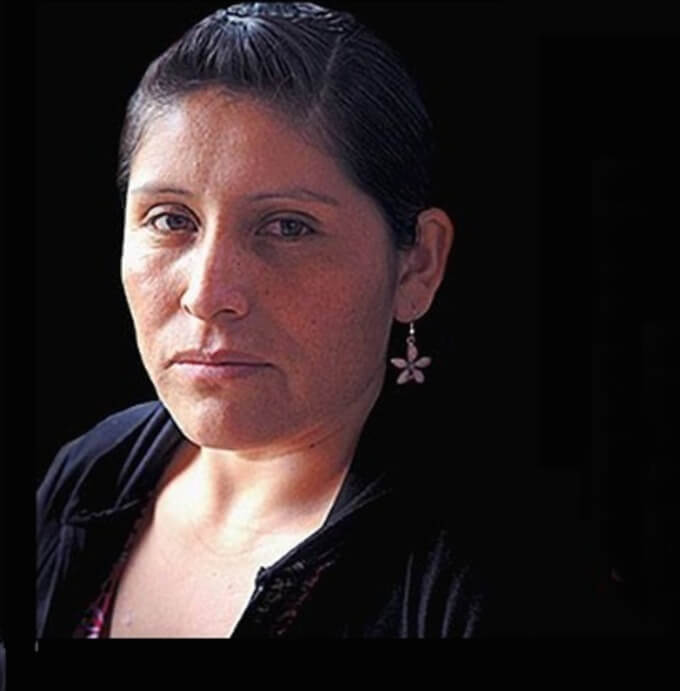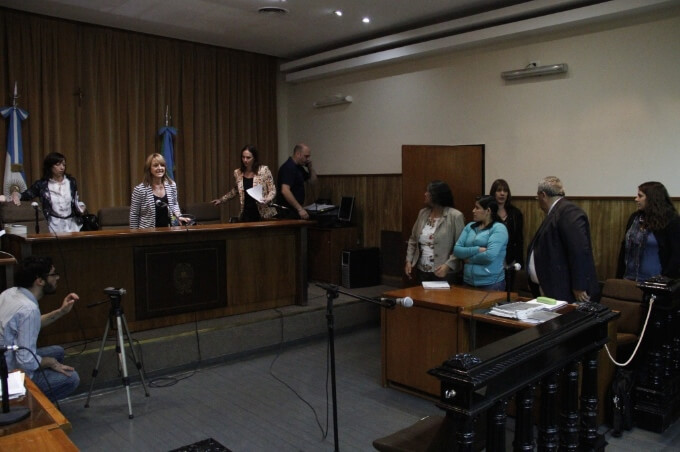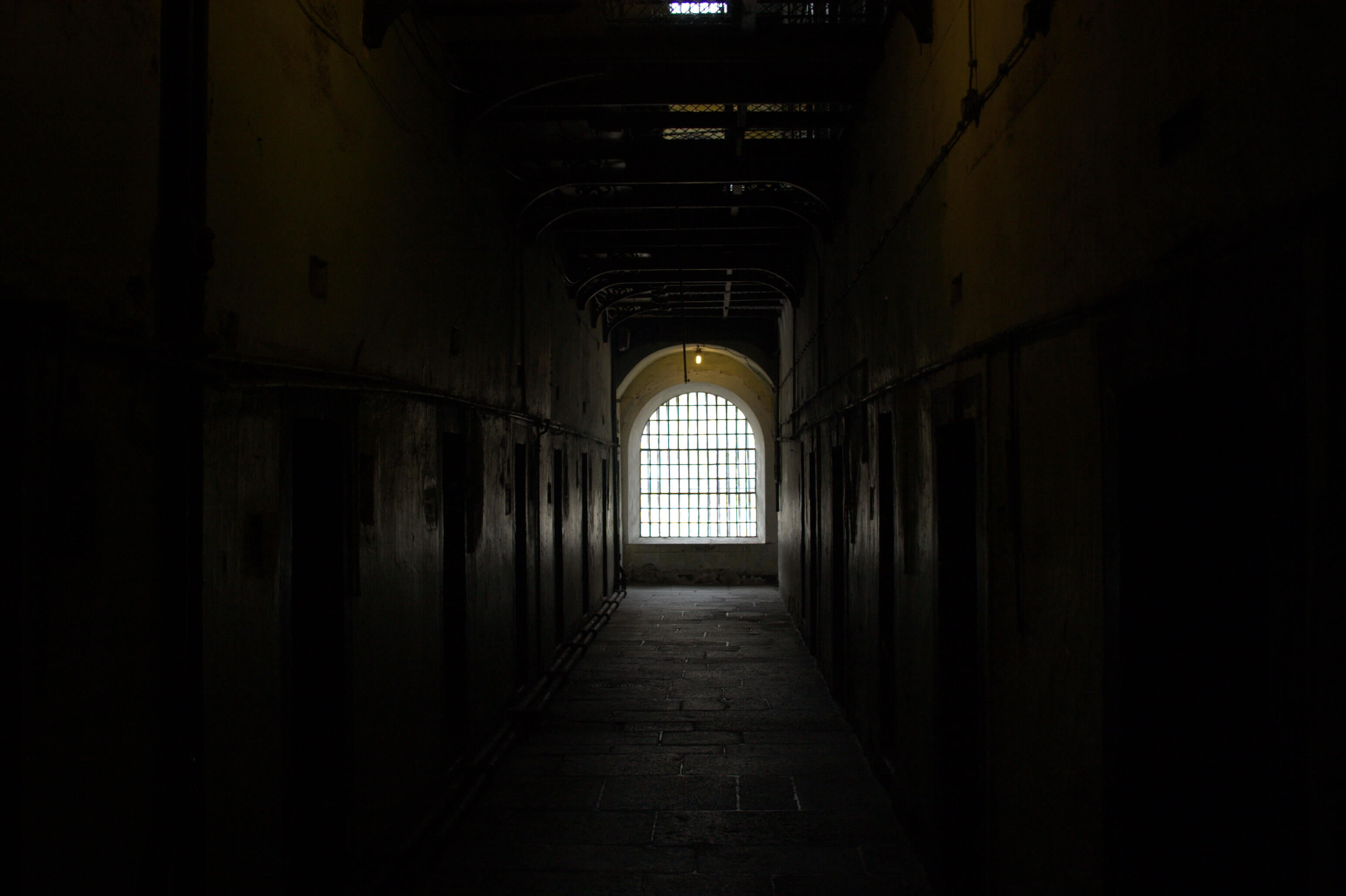
Reina Maraz Bejarano was the last person in the courtroom to understand that she had just been sentenced to life imprisonment for allegedly murdering her husband.
Maraz is from an indigenous community in Bolivia. Like many women in rural Bolivian communities, she was raised speaking the local language, not Spanish. On the day she was sentenced by the Argentine justice system, Maraz’s interpreter was translating the judges’ words from Spanish into Quechua so that she could understand. Married at 17 years old, a mother shortly after and subject to a violent marriage, Maraz was 22 when she was arrested for the murder of her husband Limber Santos. She was 26 in November 2014, when her future was determined by three Argentine judges. At that point she had already been imprisoned for four years. Because she couldn’t fully understand Spanish, she spent nearly a year of that jail time without understanding that she was accused of being responsible for her husband’s death.
Maraz’s case is emblematic of the ways in which both the dominant culture and the judicial system abuse women, especially indigenous women. For Maraz, this means being a survivor of physical and psychological violence. Then came the double injustice of being blamed for that violence by the Argentine state. Now she is a victim of a judicial system gone wrong.
A Long Path of Migration and Violence
To tell the story of how Maraz was condemned to life in Argentina’s prisons that day in court in 2014, we have to rewind to 2009, the year Maraz came to Argentina with her husband Limber Santos and their two young boys.
There are more undocumented Bolivian immigrants in Argentina than in any of Bolivia’s major cities. Many migrate from rural areas like Santos’ community in Chuquisaca, Bolivia, and often whole families move. In Maraz’s case she had no choice: her husband threatened to take away their children if she did not accompany him to Argentina.
Maraz testified in court that when they lived together in Bolivia her husband used to get drunk and beat her. Once they were in Argentina, the abuse continued. His family was complicit in the physical violence and took away Maraz’s documents.
After some months in Argentina, the Santos-Maraz family eventually settled in cramped rooms at a brick kiln where they worked in the city of Florencia Varela, in greater Buenos Aires. In a 2013 interview conducted in jail, Maraz’s interpreter translated her words, “Her children never went to school because her husband didn’t want them to. Reina was unhappy, there was never enough money because of Limber’s drinking.”
Santos was going on drinking sessions in the Buenos Aires barrio of Liniers with a man who worked and lived in the kiln also, Tito Vilca Ortiz. Vilca was to play an important role in what happened next.

Reina Maraz – in blue – with her defense lawyer and interpreter in court November 2014. Credit – Agencia ANDAR.
Sexual Violence and ‘that night’
Maraz told in court how one night Limber Santos and Vilca went out drinking. Around 5am, Vilca came back to the kiln and into Maraz’s room, where she was sleeping with the children. He woke her and horrifyingly told her ‘your husband owes me a debt, and he gave me you.’ Then he raped her in front of her children.
The lead judge, Marcela Alejandra Vissio, described the incident as improbable in her verdict because Maraz did not make a police report. But not filing a police report for rape is not unusual for women, who face significant barriers in the legal system such as reliving trauma and being victim-blamed. Data on unreported rape is hard to find in Argentina, as in many countries, but it is likely to be far under-reported. On top of the usual barriers, Maraz has the additional barrier of not fully understanding or speaking Spanish.
The aftermath of Maraz’s rape included a vicious beating at her husband’s hands. It also sparked violent conflict between Vilca and Santos.
On the morning of her husband’s death, 14 November 2010, Maraz got up at 4am to help him prepare for a trip to visit his sister to pay her back a debt. Maraz explained in court that Vilca was also up that morning, drunk. Limber Santos and he started arguing through the window of the room, and then Santos went out. At that moment, Maraz heard the sound of a padlock locking her and the children into the room.
The person who removed the lock and came into the room shortly after was not Maraz’s husband, but Vilca. She asked him where her husband was, and Vilca said Limber Santos had left for his sister’s. Then he raped her again, again in the presence of her two children.
The Aftermath of Limber Santos’ death
Maraz had no idea that her husband was dead at that moment. When there was no sign of him, she went to stay at her father-in-law’s house with her sons. She testified that she was afraid to stay at the brick kiln because of Vilca’s presence. And she went to the police and reported her husband as missing – she was worried he had been robbed when he didn’t appear at his sister’s.
Limber Santos’ body was then found in a rubbish heap on the grounds of the brick kiln. Maraz and Tito Vilca were arrested and jailed as responsible. In jail, Maraz discovered she was pregnant. Her little girl was born in Unit 33 of Prison Los Hornos of Buenos Aires.
It took nearly a full year until Maraz was informed of the charges against her in her own language. The Argentine human rights advocacy organization La Comisión Provincial por la Memoria —‘The Provincial Commission for Memory’ — carried out one of its regular prison inspections in Prison Los Hornos and realized that Maraz was unable to communicate well in Spanish. They brought a Quechua speaker to visit her.
The Battle for an Interpreter
When Maraz faced trial in October 2014, she had Frida Rojas, a Quechua-speaking interpreter, at her side. Accessing this basic right for Maraz took over two years of advocacy and legal formalities, headed by the Commission for Memory.
The battle included a trip to the Supreme Court of Argentina, who ordered the criminal court to provide Maraz with an interpreter. Even so, the Argentine state made the Commission jump through many more hoops to get Maraz the interpreter she had a right to.
Dr. Mariana Katz is in charge of the Commission’s program for Indigenous and Migrant Peoples. Katz is a lawyer, and was an observer at Maraz’s trial. In a recent interview with Intercontinental Cry, Katz said, “In all of these delays and official proceedings, the person who suffers is Reina.”
She went on, “For the Commission, the legal basis [of Maraz’s conviction] is invalid, because from the very first moment [of her arrest] they should have provided her with an interpreter.”
Language Discrimination in Court
In another violation of rights, Maraz’s sister was forbidden by the judges from testifying in her native language, even though the Quechua interpreter was present in court that day.
“When they asked her questions it was clear she didn’t understand, because she was answering something different to the question she was asked,”Katz said. “On top of that, the judges were getting annoyed.”
To convict Maraz, the judges relied on testimony from her 5-year-old son who couldn’t speak Spanish fluidly. “When they brought the boy to declare, he had to be asked the questions several times, because he also has difficulties in Spanish,” explained Katz.
Maraz’s eldest son testified in a Gesell Dome, a one-way mirror system used by law enforcement. Three expert psychologists brought to testify by Maraz’s defense lawyer discredited the Gesell Dome testimony independently of each other. They said it was carried out as an interrogation using leading questions and not as it should be — a psychological test where the child is given time to express themselves through play. Despite all this, the judges did not take into account the three psychologists’ testimony.
The judges also ignored language subtleties that could have led to different interpretations of the boy’s testimony. It was also questionable whether to allow testimony from a 5-year-old who had been subject to traumatic experiences.
More Evidence Dismissed by Judges
Other important evidence was dismissed by the judges. Vilca was also arrested for Santos’ murder. While he was in jail, the Vice Consul of Bolivia to Argentina, Jorge Valentín Herbas Rodriguez, visited him. When Vilca began to tell him the story of what had happened the night of Limber Santos’ death, Herbas stopped him and told him to save it for court. Vilca died in jail before he got a chance to tell his story in court.
Herbas testified at Maraz’s trial. It was clear that Vilca was likely to have made a full confession had he lived. But the judges dismissed the word of the diplomat as “indirect testimony.”
On 11 November 2014, the three judges unanimously declared Maraz guilty of doubly aggravated homicide. The aggravating factors were premeditation and motive of robbery. The judges thought that Maraz and Vilca were lovers and planned to murder Limber Santos for the money he was carrying, which was barely $70US.
For this alleged crime, they condemned Maraz to a life spent in prison.
“They gave Reina the same sentence they give to perpetrators of the genocide [Argentina’s ‘Dirty War’],” Katz said.

Reina Maraz has been condemned to a life in prison. Her appeal is asking for her freedom. Credit -feelsgoodlost on flickr – CC BY-SA 2.0.
Reactions to the Sentence
The gross injustice of the Argentine judicial system did not go unnoticed. Feminist activists from several organizations protested outside the court (and have continued to protest). Adolfo Pérez Esquivel, Nobel prize winner and President of the Commission for Memory, wrote an article entitled The 3 Deadly Sins: Woman, Indigenous and Poor.
Maraz’s defense lodged an appeal in Argentina’s Court of Cassation (a certain type of appeal court that examines the interpretation of the law). The Commission together with feminist and human rights organizations have submitted a briefing to the judges (an Amicus Curiae). They stressed that Maraz did not have a fair trial. The vulnerabilities of a non-Spanish speaking migrant indigenous woman were not taken into account by Maraz’s judges, they said.
The demand is for Reina Maraz’s freedom. Failing that, advocates are calling for her sentence to be transmuted to the most lenient sentence for homicide in Argentina, eight years imprisonment, of which she would have already served six. There is no date set yet for the hearing of the appeal.
The Commission believes fully that Maraz is innocent. “We (the Commission) believe in Reina’s innocence, because for nearly 6 years, when she is asked about the facts, she always tells the same story with no cracks,” Katz said. “If it were invented, she would not be able to tell the same story without some level of error. This gives us the certainty that she is innocent.”
An emblematic case of indigenous discrimination
The lead judge Vissio repeatedly stated in her verdict that Maraz, Maraz’s sister Norma Bejarano, and Maraz’s eldest son were all fluent in Spanish. The court treated their need for interpretation of the Spanish language as no more than a defense tactic. The results of this attitude were rights violations; Maraz’s sister and son were never allowed to testify in Quechua.
By Argentine law, this was illegal, but the country’s courts still don’t have interpreters on file for more languages than English, French and Portuguese — notably, all colonial languages.
It’s a symptom of a deep-seated societal norm. “We have a problem in Argentina where people think that there are very few indigenous people, despite the history of indigenous struggle in the country,” Katz said. “There is a cultural conceptualization that indigenous people don’t exist.”
The judges’ actions and verdict speak to this attitude: migrants or indigenous peoples must speak the host country’s or the colonizer’s language; if they don’t, it’s their own fault. It is deeply unfair and deliberate: they are actions that make Indigenous Peoples invisible.
Reina Maraz, Survivor
Maraz was already a survivor of terrible violence; physical and psychological violence committed by her husband and his family, and sexual violence at the hands of Tito Vilca.
Now she is surviving violence at the hands of the Argentine state. Maraz is currently under house arrest, and suffering health problems. House arrest instead of jail was a small comfort achieved by activists, principally so that she can look after her young daughter. Her other two children are in Bolivia with her parents. She hasn’t seen them in a number of years; another type of punishment.
The hope now is that the judges who hear Maraz’s appeal are subject to enough pressure to drop the charges against her.
The Argentine state not only ignored Maraz’s proven status as a Quechua-speaking migrant and so prevented her from accessing a fair trial; they used her vulnerabilities as a weapon to condemn her. These are deeply misogynist and racist actions. Reina Maraz has already been unjustly imprisoned for six years. To free her now would be the bare minimum of justice.
All references come from the author’s original interview with Dr Mariana Katz; La Comisión Provincial por la Memoria’s full coverage of Reina Maraz’s situation and trial; and the verdict of Reina Maraz’s trial.

Indigenous Peoples are putting their bodies on the line and it's our responsibility to make sure you know why. That takes time, expertise and resources - and we're up against a constant tide of misinformation and distorted coverage. By supporting IC you're empowering the kind of journalism we need, at the moment we need it most.